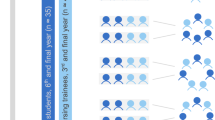Abstract
Objective
The authors describe a novel peer-peer learning activity with medical students, encompassing a specialist psychiatrist-general practitioner (GP) dyadic interchange of letters, and a group discussion facilitated by a GP and a psychiatrist to enhance students’ appreciation of the complexities of psychiatric assessment and formulation, emphasize the importance of the GP in the comprehensive longitudinal care of people with a mental illness, and improve students’ written communication skills.
Methods
Quantitative and qualitative methods were employed to evaluate the activity.
Results
Twenty-eight fifth-year medical students undertook the learning activity; of these, 20 completed the questionnaires and 18 participated in the focus groups. Quantitative feedback was good, with most agreeing or strongly agreeing that the activity met the learning objectives. The qualitative outcomes suggested the students found the exercise relevant and useful in clarifying their communication style regarding a patient with a psychiatric problem.
Conclusions
The use of peer-peer learning using a “GP letter” can go some way towards meeting a number of teaching and learning challenges pertinent to psychiatry.
Similar content being viewed by others

References
Couper J, Hawthorne L, Hawthorne G, Tan E-S, Roberts A. Communication skills and undergraduate psychiatry: a description of an innovative approach to prepare medical students for their clinical psychiatry attachment. Acad Psychiatry. 2005;29:297–300.
Harrison CM, Britt HC, Charles J. Better outcomes or better access—which was better for mental health care. MJA. 2012;197:170–2.
Dawson MT, Hocking B, McClean R, Buchanan J. Consumers and family carers’ views of GP Psychiatry. In: Judd F, Blashki G, Piterman L, editors. General practice psychiatry. Australia: McGraw Hill; 2007. p. 32–41.
Couper J, Harari E. Use of the psychiatric consultation letter as a therapeutic tool. Australas Psychiatry. 2004;12:365–8.
Kolb DA. Experiential learning. Inglewood Cliffs: Prentice Hall; 1984.
Tattersall MHN, Butow PN, Brown JE, Thompson JF. Improving doctors’ letters. MJA. 2002;177:516–20.
Garrison D, Lyness JM, Frank JB, Epstein RM. Qualitative analysis of medical student impressions of a narrative exercise in the third-year psychiatry clerkship. Acad Med. 2011;86:85–9.
Biggs J, Tang C. Teaching for quality learning at university. 3rd ed. Maidenhead: McGraw Hill; 2007.
Boud D, Cohen R, Sampson J. Peer learning and assessment. Assess Eval High Educ. 1999;24:413–26.
Curran S, Bowie PCW. Teaching psychiatry to medical undergraduates. Adv Psychiatr Treat. 1988;4:167–71.
Hughes T, Williams C. Teaching general psychiatry to medical undergraduates. Adv Psychiatr Treat. 1998;4:177–82.
El-Sayeh HG, Budd S, Waller R, Holmes J. How to win the hearts and minds of students in psychiatry. Adv Psychiatr Treat. 2006;12:182–92.
Butler M, Kane RL, McAlpine D, et al (2008) Integration of mental health/substance abuse and primary care. Rockville, MD: Agency for Healthcare Research and Quality. 173 (www.ncbi.nlm.nih.gov/books/NBK38636 accessed 23 Apr 2013)
Epstein R, Franks P, Fiscella K, et al. Measuring patient-centred communication in patient-physician consultations: theoretical and practical issues. Soc Sci Med. 2005;61:1516–28.
Kaplan SH, Greenfield S, Ware Jr JE. Assessing the effects of physician-patient interactions on the outcomes of chronic medical disease. Med Care. 1989;27(suppl):S110–27.
Stewart MA. Effective physician-patient communication and mental health outcomes: a review. Can Med Assoc J. 1995;152:1423–33.
Disclosure
The authors declare that they have no conflicts of interest pertinent to this manuscript.
Author information
Authors and Affiliations
Corresponding author
Rights and permissions
About this article
Cite this article
Castle, D., Sanci, L., Hamilton, B. et al. Teaching Psychiatry to Undergraduates: Peer-Peer Learning Using a “GP Letter”. Acad Psychiatry 38, 433–437 (2014). https://doi.org/10.1007/s40596-014-0088-9
Received:
Accepted:
Published:
Issue Date:
DOI: https://doi.org/10.1007/s40596-014-0088-9



